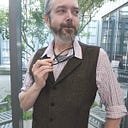Thank you for your articles and sharing your experience. You mentioned in a previous article that it was a world religions class that wrecked the walls of your mind. For me, it was ancient Christianity, which taught me about the Council of Niceae and other controversies of the early church, including the schism between the Roman Catholic Church and Eastern Orthodox.
Since then I had been a “borderline” atheist. I could never quite make the leap to completely denying the existence of God. But I knew our common definitions and concepts of God were mostly wrong. As a divine infinite being, how could we possibly define it? Any attempt would necessarily be deficient, misleading.
I learned of pantheism from Spinoza. That seemed closer to the truth of what God is. In practice, simply replace “universe” with “God”, and you’re close the telling the truth. So in my view (and the 18th century Enlightenment view), the atheist is studying God by studying the universe. As the Pragmatist philosopher William James put it roughly, if we’re saying different words but pointing at the same thing, then we’re talking about the same thing. This is how I translate scientific facts into “church-speak”.
This reply is already too long…
That mindset and worldview worked for me throughout my twenties and into my mid-thirties. Then 2020 happened. Somehow all of this comfortable “wisdom” became insufficient. I have not abandoned my pantheistic, borderline atheistic, beliefs but I have evolved them a bit. I re-opened my mind to possibilities.
I took another, more serious, look at Taoism, Buddhism, Hinduism, Kabbalah, and other pagan and shamanic beliefs. I have found they all essentially say the same thing. They mostly agree with the pantheism I was already cultivating. If nothing else, studying these religious beliefs make me a way better DM for my DnD groups =)
All that said, my quest now is to transcend dualistic thinking. It goes way deeper than “there is no good or evil”. If you can understand that the concepts “everything” and “nothing”, truly are the same thing, then I believe you’re closer to God, the universe, the Tao… whatever name you choose to use…
If you’re interested at all in melting your brain further, I suggest reading “Nonduality” by David R. Loy. It’s a comparative study of eastern religions and western philosophy and somewhat modern cognitive psychology (it was written in the 80’s)
